Filter by
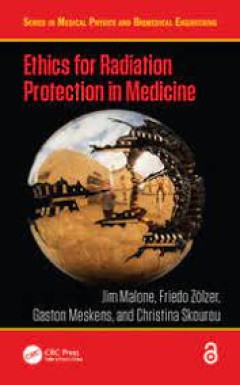
Ethics for Radiation Protection in Medicine
This book presents an up to date ethical framework for radiological protection in medicine. It is consistent with the requirements of the system of radiation protection and with the expectations of medical ethics. It presents an approach rooted in the medical tradition, and alert to contemporary social expectations. It provides readers with a practical framework against which they can assess th…
- Edition
- -
- ISBN/ISSN
- 9781351372497
- Collation
- -
- Series Title
- -
- Call Number
- -
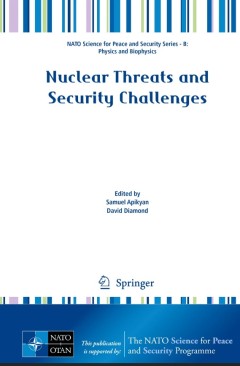
Nuclear Threats and Security Challenges
With the dissolution of the Soviet Union the nuclear threats facing the world are constantly evolving and have grown more complex since the end of the Cold War. The diversion of complete weapon systems or nuclear material to rogue nations and terrorist organizations has increased. The events of the past years have proved the necessity to reevaluate these threats on a level never before consider…
- Edition
- 1
- ISBN/ISSN
- 978-94-017-9893-8
- Collation
- IX, 285
- Series Title
- NATO Science for Peace and Security Series B: Physics and Biophysics
- Call Number
- -
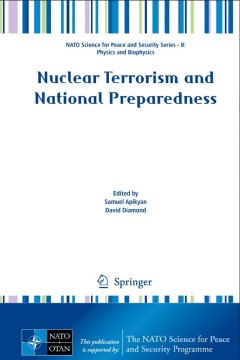
Nuclear Terrorism and National Preparedness
The nuclear crisis in Fukushima and growing threats of nuclear terrorism must serve as a wake-up call, prompting greater action to prepare ourselves for nuclear and radiological disasters. Our strategy to prepare for these threats is multi-layered and the events of these past years have proved the necessity to re-evaluate the national and international preparedness goals on a scale never before…
- Edition
- 1
- ISBN/ISSN
- 978-94-017-9890-7
- Collation
- IX, 263
- Series Title
- -
- Call Number
- -
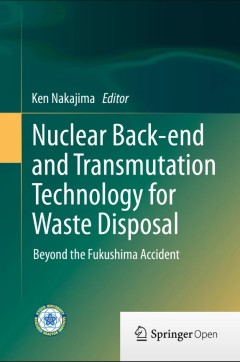
Nuclear Back-end and Transmutation Technology for Waste Disposal:Beyond the F…
This book covers essential aspects of transmutation technologies, highlighting especially the advances in Japan. The accident at the Fukushima Daiichi Nuclear Power Plant (NPP) has caused us to focus attention on a large amount of spent nuclear fuels stored in NPPs. In addition, public anxiety regarding the treatment and disposal of high-level radioactive wastes that require long-term control i…
- Edition
- 1
- ISBN/ISSN
- 978-4-431-55110-2
- Collation
- XV, 341
- Series Title
- -
- Call Number
- -
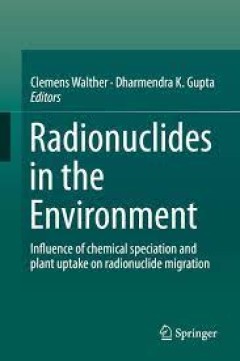
Radionuclides in the Environment Influence of chemical speciation and plant …
This book provides extensive and comprehensive information to researchers and academicians who are interested in radionuclide contamination, its sources and environmental impact. It is also useful for graduate and undergraduate students specializing in radioactive-waste disposal and its impact on natural as well as manmade environments. A number of sites are affected by large legacies of was…
- Edition
- -
- ISBN/ISSN
- 978-3-319-22171-7
- Collation
- -
- Series Title
- -
- Call Number
- -
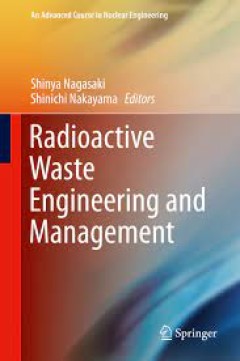
Radioactive Waste Engineering and Management
This book describes essential and effective management for reliably ensuring public safety from radioactive wastes in Japan. This is the first book to cover many aspects of wastes from the nuclear fuel cycle to research and medical use, allowing readers to understand the characterization, treatment and final disposal of generated wastes, performance assessment, institutional systems, and social…
- Edition
- -
- ISBN/ISSN
- 978-4-431-55417-2
- Collation
- -
- Series Title
- -
- Call Number
- -
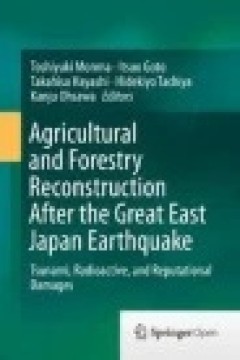
Agricultural and Forestry Reconstruction After the Great East Japan Earthquak…
This book summarizes the results of 3 years of agricultural and forestry reconstructive efforts and applied research conducted directly in the affected areas of Fukushima following the Great East Japan Earthquake. It describes fast and effective revival methods and technologies from tsunami and radiation damages, demonstrated through the collaborative efforts of researchers, students, local far…
- Edition
- Ed. 1
- ISBN/ISSN
- 978-4-431-55558-2
- Collation
- XVII, 264
- Series Title
- -
- Call Number
- 536.33 AGR a
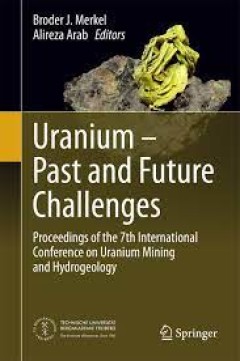
Uranium - Past and Future Challenges Proceedings of the 7th International Co…
This book is the collection of papers from the latest International Uranium Mining and Hydrogeology Conference (UMH VII) held in September 2014, in Freiberg, Germany. It is divided to five sessions: Uranium Mining, Uranium and Phosphates, Clean-up technologies for water and soil. Uranium and daughter nuclides and basic research and modeling. Each session covers a wide range of related topic and…
- Edition
- -
- ISBN/ISSN
- 978-3-319-11059-2
- Collation
- 272 b/w illustrations, 88 illustrations in colour
- Series Title
- -
- Call Number
- -
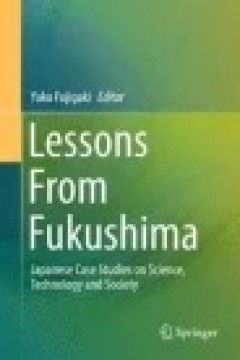
Lessons From Fukushima: Japanese Case Studies on Science, Technology and Society
This book is about the consequences of the Fukushima disaster in light of their technological, societal, political, cultural and environmental origins. The magnitude of the nuclear accident is investigated in this book in the contexts of politics, economy, and society. The authors scrutinize the relationships between science, technology and society leading to this accident. Further, the authors…
- Edition
- -
- ISBN/ISSN
- 978-3-319-15353-7
- Collation
- -
- Series Title
- -
- Call Number
- -
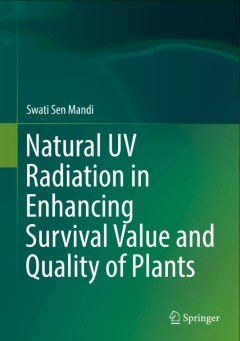
Natural UV Radiation in Enhancing Survival Value and Quality of Plants
This book is the first of its kind to highlight the positive impact of natural UV radiation on plants through unique adaptations in various metabolic pathways, and provides an evolutionary sketch of the development of molecular mechanisms for protecting plants from solar UV ever since their migration to terrestrial habitats. Experimental evidence is provided for establishing how plants, through…
- Edition
- 1
- ISBN/ISSN
- 978-81-322-2765-6
- Collation
- XIX, 204
- Series Title
- -
- Call Number
- -
 Computer Science, Information & General Works
Computer Science, Information & General Works  Philosophy & Psychology
Philosophy & Psychology  Religion
Religion  Social Sciences
Social Sciences  Language
Language  Pure Science
Pure Science  Applied Sciences
Applied Sciences  Art & Recreation
Art & Recreation  Literature
Literature  History & Geography
History & Geography